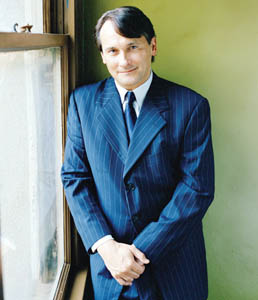![[Metroactive Music]](/music/gifs/music468.gif)
[ Music Index | Silicon Valley | Metroactive Home | Archives ]

Photograph by Wendy Lynch The O'Riley Factor: 'No Surprises,' 'Paranoid Android,' 'Knives Out' and 'Let Down' are some of the Radiohead songs reinterpreted by Christopher O'Riley. OK Composer Christopher O'Riley believes Radiohead and Dmitri Shostakovich have more in common than you may think By Peter Koht THANKS to Homeland Security and the American Embassy in Spain, our shores are safe from the feverish Celtic dancing and bagpipes of Llan de Cubel. This group of Asturian (northern Spanish) musicians recently had their performers' visas revoked only days before their concert marked the commencement of the 2005�06 UCSC Arts & Lectures Series. The honor of opening up now falls upon the capable shoulders of Christopher O'Riley, classical pianist, radio host and scholar of subversive music. O'Riley's scheduled concert program includes a heavy dose of political subtext. It features works by two seemingly disparate composers who have sublimated direct expression in favor of ironic phrasing and hidden messages: rock gods Radiohead and Russian composer Dmitri Shostakovich. "Shostakovich was one of the first composers that had to deal with music as subtext, not necessarily the direct expression of something, but the ironic displacement of musical expression," says O'Riley. The bulk of Shostakovich's publicly performed music, O'Riley explains, was concerned with "that which could be expressed and that which couldn't be expressed. He was the first composer in history to be reviled by the tyrant of the day. Stalin was basically sitting in watch on every new composition." After the Soviet newspaper Pravda condemned Shostakovich's Lady Macbeth in 1936 in an article called "Muddle Instead of Music," the composer had to play his liberal-leaning cards closer to his chest to avoid the Great Terror. "It's kind of amazing to think that a composer would warrant that kind of attention," O'Riley says. "One can't imagine John Adams being called to the White House because George Bush didn't like his orchestration." George might have more of an issue with Radiohead, whose latest record was called Hail to the Thief, a not-so-subtle jab at the hanging chads that gave the United States its first court-appointed president. O'Riley presents Radiohead bereft of Thom Yorke's occasionally scathing lyrics, and he finds their music to be the perfect foil for the preludes and fugues of Shostakovich. "My idea was to have complexity and simplicity juxtaposed, because I thought it would help my concentration as a performer, and I think that it helps the audience in terms of relief from complexity." In fact, it's this complexity that was a hallmark of the post-tonal style that led Shostakovich so far astray from Stalinist aesthetics. Finding refuge from orchestral works in composing for chamber ensemble and piano, the composer found a perfect vehicle for his harmonic inventiveness in the ancient art of the fugue. "The fugue is arguably the most difficult kind of song to write," claims O'Riley. "You are dealing with one melody distributed amongst four voices. It's not exactly 'Row, Row, Row Your Boat.' I think there have been a handful of composers who have written fugues convincingly over the last four or five hundred years." O'Riley is certainly a fan of Shostakovich's efforts in the fugue form. Though he believes Bach will forever remain the master of the fugue, in O'Riley's estimation, the 24 preludes and fugues of Shostakovich represent "the most important body of music to have come out of the piano in the 20th century." Placing a selection of these pieces against the torturous and emotive songs of Radiohead will create a concert program unlike any other to have graced the stage of the UCSC Recital Hall. When asked about incorporating hip rock songs into a recital of 20th-century piano literature, O'Riley observes that "within our time frame, I am adding new things to the classical canon, but this is not something that hasn't been done a lot before. For example, [15th-century Flemish composer] Josquin Des Prez would use a ribald folk song as a figured bass for the basis of an entire mass setting. That kind of porousness between genres has not changed so much through history." Besides, O'Riley says, "People need to be given back their good judgment and not be told on the basis of genre prejudice what music is good."
Shostakovich Meets Radiohead happens Sunday (Sept. 25) at 7pm at the UC�Santa Cruz Music Center Recital Hall. Tickets are $28�$40. See http://artslectures.ucsc.edu for more info.
Send a letter to the editor about this story to letters@metronews.com. [ Silicon Valley | Metroactive Home | Archives ]
|
From the September 21-27, 2005 issue of Metro, Silicon Valley's Weekly Newspaper.
Copyright © 2005 Metro Publishing Inc. Metroactive is affiliated with the Boulevards Network.
For more information about the San Jose/Silicon Valley area, visit sanjose.com.